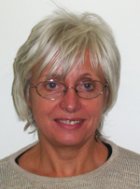
Dr Penny Jeggo
| Post: | Emeritus Professor (Genome Damage and Stability) |
| Location: | GENOME CENTRE G3.04 |
| Email: | P.A.Jeggo@sussex.ac.uk |
Biography
Penny Jeggo has focused on studying the response to DNA damage in mammalian cells and its contribution to human health. A major focus has been in studying the response to DNA double strand breaks (DSBs), including pathways of DSB repair, the signalling response to DSBs and, more recently, the interplay between the repair pathways and the signalling response. Penny played a key role in identifying the components of DNA-PK (Ku and DNA-PKcs) as being important components of DNA non-homologous end-joining (NHEJ), the major DSB repair pathway in mammalian cells, representing the first identification of genes having a major role in promoting radioresistance. She also showed that NHEJ functions to rejoin the programmed DSBs induced during VD)J recombination, and therefore represent important components required for the development of the immune response. This prompted a search for severe combined immunodeficiency(SCID) patients, who might also show radiosensitivity (RS-SCID). LIG4 Syndrome was the first such disorder identified; to date mutations in XLF, Artemis and DNAPKcs have also been shown to confer an RS-SCID phenotype. Patients deficient in some of these proteins also display microcephaly and growth delay demonstrating that NHEJ is particularly important during neuronal embryogenesis. A mouse model for LIG4 Syndrome has allowed the role of DNA ligase IV during neuronal embryogenesis to be dissected.
Radiation is a potent inducer of DSBs and Penny has studied the radiation response, with a particular focus on aspects of radiation protection. This is an important issue since we are frequently exposed to diagnostic X-rays and CT scans. Work is ongoing in the laboratory evaluating the impact of low doses of radiation on stem cells, including the embryonic neuronal stem cells.
Extendiing from the work of RS-SCID patients, the Jeggo laboratory has also provided insight into the basis underlying Seckel Syndrome (SS), a disorder of primordial dwarfism and microcephaly. Mutations in ATR (ataxia and telangiectasia mutated related protein) were identified as the first causal defect for SS. Subsequently, the Jeggo laboratory also identified mutations in PCNT in Seckel-like patients, who display MOPD type II. More recently, mutations have been identified in ORC1 in Meier Gorlin Syndrome (MGS) pateints, who have overlapping features with SS. Collectively, these studies reveal the important of the damage response proteins during development and the precise role play by these proteins continues to be examined.
THe laboratory carries out diagnostic studies for these disorders, particularly for RS-SCID.
Community and Business
Committee and Boards
Member of a task group for the International Committee for Radiation Protection (completed)
Member of the MRC Molecular Advisory Board (completed)
Member of the CRUK scientific funding committee (completed).
Member of a sub-committee for AGIR (Advisory group on ionising radiation) (completed).
Member of a sub-committee for AGIR on radiosensitive individuals (completed)
Committee Member of Comare (Committee for Medical Aspects of Radiation Effects) (completed)
Member of the BBSRC’s committee for Evaluation of the Biochemistry and Cell Biology Responsive Mode Porfolio (completed)
Editor for DNA repair (ongoing).
Editorial Board Member for: International Journal of Radiation Biology ; Oncogene; Nucleic Acids Research, Biochemical Journal (ongoing).
Member of an international laboratory established by National Institute for Radiation Science (NIRS), Chiba, Japan.
Committee Member of the Nucleic Acids Group.
Committee member of UK’s Association for Radiation Research.
Member of the organising committee for ATM Workshops.

